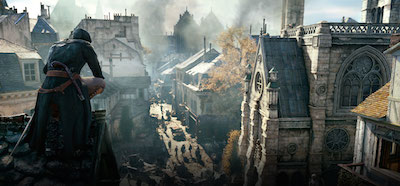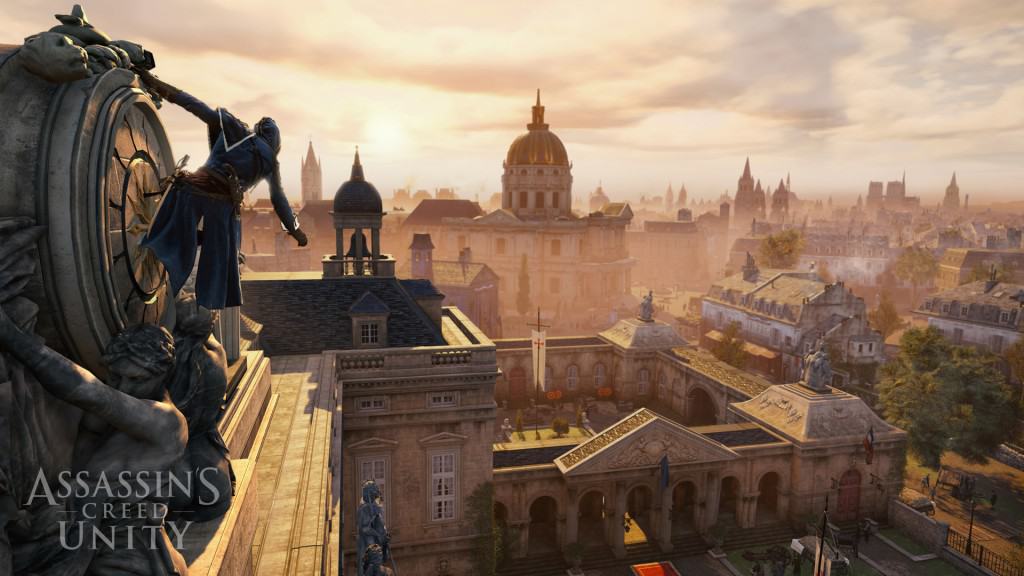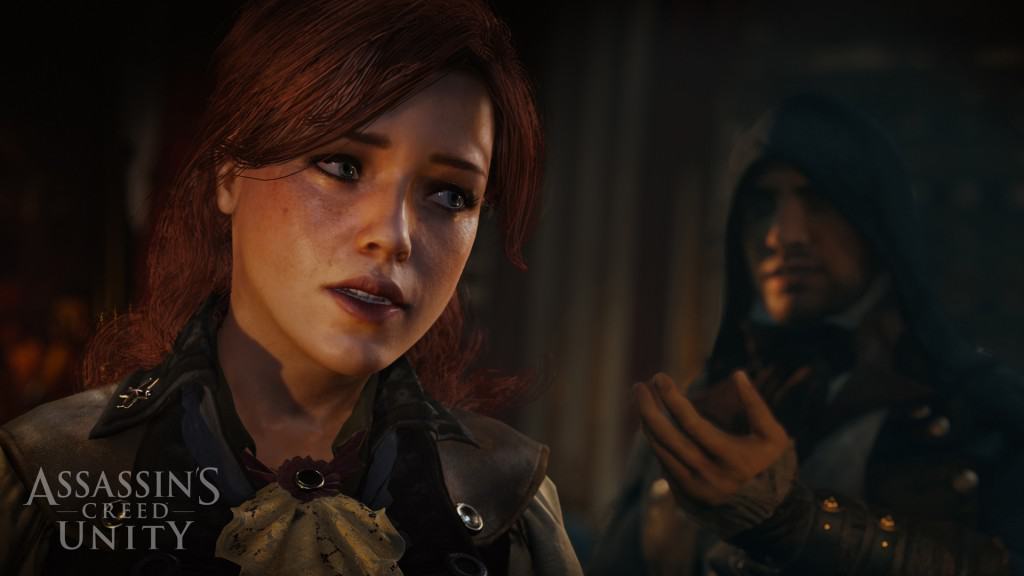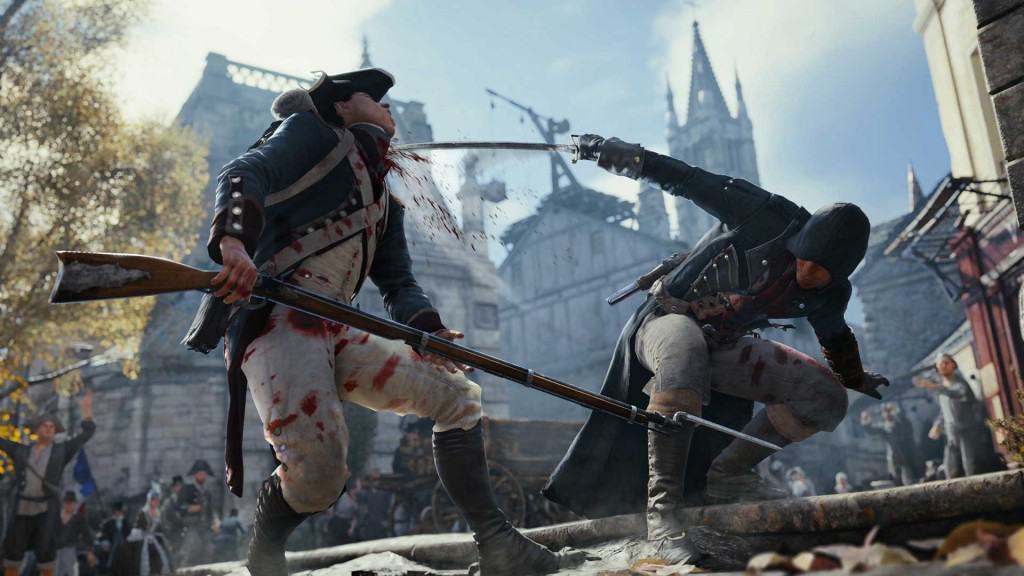It’s fair to say that Assassin’s Creed has become one of Ubisoft’s most bankable franchises, clocking up an annual release schedule to rival Call Of Duty – after the series’ debut in 2007, 2008 was the last year that didn’t see the release of a main series Assassin’s Creed game. Hell, this year has seen not one, but two adventures appear almost simultaneously – we’re going to focus on Assassin’s Creed Unity, which marks the series’ debut on the latest generation of consoles. All told, the launch was marred by reports that the game was a buggy mess – but now, a few weeks on, has Ubisoft managed to patch out the most troubling issues?
[like_to_read][/like_to_read]
The answer is ‘sort of’. We certainly didn’t experience any of the game’s most widely reported early concerns, such as getting stuck in hay carts or falling through the floor, but we didn’t exactly get off to the best start with AC Unity either. In the very first mission, we witnessed NPCs glitch in and out of the ground before the game froze mid-mission during a cutscene. Indeed, the most prevalent issue with the game is that it tends to freeze shortly after dropping its connection to Ubisoft’s servers. Fortunately, on PS4 at least, we could fix this by backing out to the PS menu and running a connection test to re-establish connectivity, but the fact remains that this simply isn’t something that should be happening. Even if we give Ubisoft the benefit of the doubt and allow for a temperamental connection on our end rather than wonky servers on theirs, it’s not as if this is a game that requires a constant connection to function in the same manner as, say, Destiny or World Of Warcraft. Indeed, the online elements are limited to the game’s fun but non-essential co-op missions, and some superfluous integration with things like Uplay, AC Initiates and the game’s companion app – and don’t worry if you’ve no idea what any of those things are, you’re not missing out on a whole lot. Thankfully, the game’s latest patch seems to have decreased the frequency of such errors, but the issue does still remain at the time of writing.
So, with that caveat laid out for you, let’s get to the crux of whether AC Unity is a good game or not. The first thing you’ll notice is that it’s absolutely gorgeous, with the likes of Notre Dame cathedral and the Hôtel de Ville being lovingly recreated as part of a sprawling late-eighteenth representation of Paris during the French Revolution. The series signature panoramas are the most beautiful they’ve ever been, and the streets are more crowded and lifelike than ever, filled with hundreds of people all going about their daily business or enacting riotous protests. Of course, with so many characters on screen, there’s some odd and occasionally glitchy behaviour at times – such as when we stumbled across a group of people throwing rotten fruit at a man who was stuck in a small tree.
In terms of the game world, pirate ships and sailing are obviously out, replaced with an AC II style European city sandbox – so if you missed climbing huge monuments in AC: Black Flag, you’ll feel more at home here. On the other hand, the increased horsepower does allow for a far more natural integration of interior spaces, which helps increase variety and make the world feel more lived in. Tangentially related to both those activities is the new ‘free-run down’ option (used by holding circle when free-running), which allows to to make a more controlled descent from buildings when there isn’t a convenient bale of hay to dive into – it not only looks cool, but provides a better option for getting back to the ground than simply chucking yourself off a building and hoping you have enough health to survive the fall. Though the free-running system still has its flaws – there are times when you’ll struggle to get through a window, end up awkwardly perched on a chair or be unable to stop clinging to a wall – its good to see Ubisoft make a concerted effort to improve it.
Mechanically, Unity feels like it’s going back to basics, but with a few tweaks to make things more streamlined. Indeed, you may find yourself missing certain abilities you took for granted in past games, such as the double assassination or the ability to use a ranged weapon. That’s because the game now features a fairly basic unlock system, meaning you’ll have to use points earned during missions to enable the aforementioned abilities, along with various others such as special combat moves, lock-picking, health upgrades and a variety of different bombs. This system could have felt tacked on, but it makes sense – Arno isn’t going to start out as an all-powerful badass, after all. Besides, the freedom of choice means you don’t have to waste points on abilities you’re never going to use – which is just as well, because you won’t have enough points to unlock everything until you’ve finished pretty much every single-player and co-op mission in the game. This system runs parallel with an equipment upgrade system, which allows you to spend the cash you earn from doing side-missions and other activities on better armour and weapons. The game assigns a 5-point difficulty rating to each mission, so it’s easy to contrast that with your current equipment level and figure out whether or not you’re under-equipped for a particular task.
You might want to invest in steath-based abilities first of all though, because combat has been overhauled. No longer will you be able to slowly block and counter your way through a fight, or chain-kill your way through a horde, as enemies are now more aggressive and not afraid to attack you while you’re laying into their mates. On top of that, your defensive options are now limited to dodging – safer, but doesn’t allow much of an opportunity to counter – and parrying – more risky, but if timed right gives you a good window of opportunity to strike back. I’d recommend making a stronger melee weapon an early purchase, otherwise fights with more than a handful of enemies become unmanageable. The game does still have the hallmark ‘get-out-of-jail-free’ smoke bomb though, and there are times you’ll be thankful for it – though it’s not quite as silly as it has been in previous games, you can still use it to get a couple of free kills or just bail from a combat situation entirely. And if you find yourself running out, you can always buy equipment that allows you to hold more, or pick up the functionally identical stun grenade ability. Stealth is further promoted by the inclusion of a dedicated ‘stealth mode’ and a cover system, though both of these features seem a little half-baked – it’s not always entirely clear whether you’re benefitting from being in stealth mode, and the cover system veers between not functioning correctly and being hilariously abusable. Still, it’s always fun to run away from a group of enemies, take cover out of sight and insta-kill the first unfortunate schmuck who runs round the corner – we even managed to inadvertently kill one of our assassination targets this way.
Story-wise, Unity takes a step back from the ongoing turmoil of the revolution and focuses on the tale of Arno Dorian, a charming young rogue who might remind long-time Assassin’s Creed fans of a certain Ezio Auditore. After losing both his biological and adoptive fathers to the murky politics of the Assassin/Templar conflict, he ends up imprisoned in the Bastille in Paris, only to be presented with an escape opportunity when said Bastille is stormed by angry revolutionaries. With no-one else left to turn to, he looks to the Assassins for redemption – which rather puts him at odds with his childhood best friend and sweetheart Élise de la Serre. Without wishing to spoil too much, Élise has a significant role to play in the story and proves to be a strong-willed, capable and independent female character, something which is definitely worthy of praise (particularly after all the flak Ubisoft got for not including female character models in the game’s co-op). While the lack of direct engagement with the events of the French Revolution might seem like a wasted opportunity in the early stages of the story, there’s some satisfying intersection later on – and besides, it’s probably a good thing that Unity doesn’t lay the history on as thick as, say, Assassin’s Creed III.
The story missions prove to be some of the most satisfying in the game, particularly the more open-ended assassinations, the best of which hark back to the very first Assassin’s Creed by plonking a target in the middle of an area and leaving it up to you how you deal with them. There are optional objectives to complete which may make your life easier or offer up alternative methods to dispatch your enemy, but you’re not obliged to engage with them at all if you don’t want to. Most missions also present optional challenges to complete, but only the most die-hard of completionists will want to worry about those, as they often seem quite arbitrary and can occasionally ask you to use abilities that you may not have chosen to unlock yet. There are other subtle improvements that help make the story missions more enjoyable – for example, the dreaded tailing missions have been made slightly less obnoxious by allowing you the chance to pick up your target’s trail after losing sight of them for a few seconds, rather than it being an instant mission fail.
Outside of the main story, however, the quality of content is more uneven. There’s plenty of it, no question about that – each time you synchronise a new viewpoint you’ll be positively overwhelmed at the amount of missions and collectable doodads that appear on the map – the problem is that not all of it is as fun or engaging as the main storyline. The most successful side quests are the murder mysteries and the Nostradamus enigmas, both of which give you a break from the action and generally require you to use your brain a little. Murder mysteries are just as they sound – comb the crime scene and surrounding areas of interest for clues and witness statements, then fathom out who the perpetrator is. These range from the blatantly obvious to those that might make you think twice – though the penalty for a false accusation is merely that you get docked some of the money you’d get from completing the quest. The Nostradamus enigmas, on the other hand, will test your knowledge of Paris with a series of riddles that will often require you to delve into the game’s encyclopaedia to figure out which location you need to search next. It’s a neat concept, though it can be a bit hit-and-miss – you’ll feel a real sense of satisfaction when you figure out the answer for yourself, but on the other hand, vague clues and red herrings will leave you frustrated enough to just look up the answer on the internet.
The rest of the side-content largely offers up more of the same AC gameplay you’d expect. The ‘Paris Stories’ side quests introduce you to colourful figures from the history of the French Revolution, but often boil down to the same core ideas – i.e. go here, steal this thing/kill these dudes. The ‘Social Club’ and ‘Cafe Theatre’ missions are pretty similar, but have the mechanical advantage of offering more than a one-time benefit – they’ll increase the amount of money you’ll earn from your home base, making them by far the best source of income in the long run (there’s a pro tip for those who don’t want to complete every side quest ever). At the bottom of the pile of side content come collectables – collecting chests (for money) and tricolour cockades (for cosmetic unlocks) honestly just feels like busywork, and there are so many of them that it borders on ridiculous. Seriously, there must be about 300 chests scattered across Paris!
Finally, there’s the game’s co-op missions, which represent a landmark for the series – fans have been begging for free-roaming co-op gameplay for years now, and Unity’s offering comes as near as dammit to giving them their wish. There are two types – the more open-ended brotherhood missions, and stealth-focused heists. The brotherhood missions essentially give you the same sandbox gameplay as the single-player, but with the added benefit of an extra pair of hands or three, while the heist missions grant you and your co-op partners extra rewards for staying undetected – though you won’t fail the mission for charging in like a madman, if you so desire. You can play either type of mission with friends or strangers, though playing with your friends is obviously more fun – it’s also possible to play these missions alone, so no-one need miss out on the extra content. Overall, the co-op is a decent addition and certainly does the game no harm, though equally if you want to skip over if you won’t miss out on too much.
In the end, despite its problems, Assassin’s Creed Unity maintains the quality of the series, and is certainly worth looking into for its single-player campaign. How much more you get out of the game might depend on just how much AC gameplay you fancy, and whether or not you’ve got friends who are into the series to play co-op with. Next time though guys, maybe hold off launching the game until you’ve got something that’s more “ground-breaking” than just plain “broken”, yeah?










